Obama victorious, but not yet the master politician
- Published
- comments
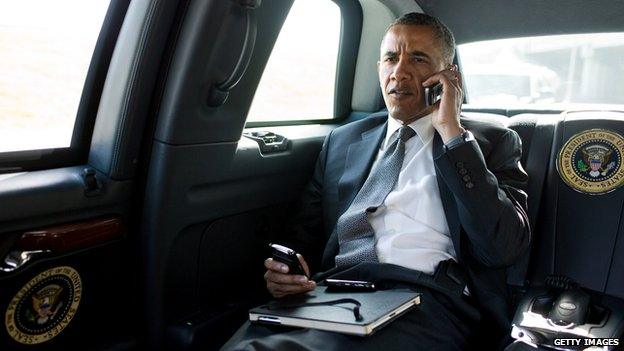
Barack Obama has been re-elected president of the United States, defeating his Republican rival Mitt Romney. But the last four years have been a rocky ride for him, and a test of his leadership qualities.
It was the oil spill in the Gulf of Mexico where I first really questioned Obama's political skills.
Heading out in a speed-boat to see the oil spill, I felt exhilarated in the hot sun - the wind blowing spray in my face.
I felt as excited as a little boy as I waded ashore a tiny island looking for tell-tale signs of rusty-red liquid among the puddles and reeds.
I was pleased to find a restaurant owner, standing over a steaming vat of crawfish, explaining how the catastrophe threatened her business.
There it is. It's not pretty, but I love my job - and sometimes it means covering situations that are dreadful for other people.
Of course I wish they hadn't happened, but for me, they are an opportunity and - frankly - a thrill.
Some politicians feel the same. Those who get called "great", are the ones who seize whatever moment comes their way, make it their own, impose their will on it - indeed shape it - to make it better for their people.
In the Gulf, Obama seemed curiously detached from the people. A president making a speech from the Oval Office is a big moment, and I watched it from a house on the shore, with the concerned owner, who was in the tourism business.
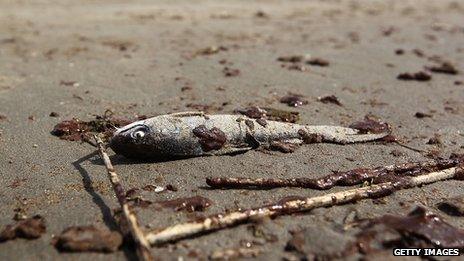
It wasn't a bad speech - the president had said sensible things. But he hadn't wrought the phrases that make a nation lean forward on the sofa, or bring strong Americans to the point of tears. It was a bit ordinary.
Until then, I had resisted the conclusion that he wasn't all that he was cracked up to be. The criticism seemed premature, and missing the point - he was elected to be different.
So many of the attacks, then and now, are the puerile work of fantasists - that he was born in Kenya, is a communist revolutionary, or secretly a convert to Islam.
They are attacks on an icon for daring to exist, and they make it easier to be over-generous in overlooking the flaws of the real man.
He was accused of dithering before deciding what to do over Afghanistan. Much of the world might be relieved that he thought before acting.
Some expressed surprise that he tackled healthcare at the same time as the economic crisis - but if he was going to do something big, he had to start it in that first year.
But it was clumsy in execution. The deal-making was grubby, Obama didn't impose his will with that false bonhomie, back-slapping and elbow-grabbing that is the heart of the dark art of handling Congress.
It is curiously easy for someone with real power to awe these wily vain old men. Obama couldn't stoop. He barely conquered, and what emerged was an obscure compromise, hard to sell in a 10-second sound bite.
On the anniversary of his victory, I sat around the kitchen table in student digs to hear the complaints of young people who had celebrated that night in Grant Park.
They were worried that he was too keen to use the troops, hadn't moved ahead on gay rights, or immigration. Fair enough. A leader of the left will often disappoint the left.
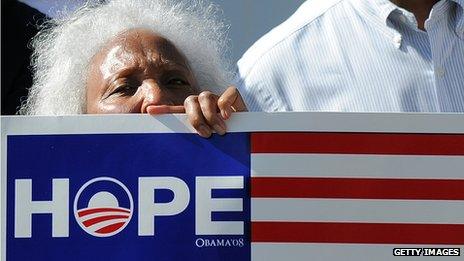
During the mid-term elections, I travelled across the country, clutching that famous poster of hope, asking people if they still had any. Despite the state of the economy, many did.
But it did not stop Obama getting what he called a "shellacking". Rarely have I seen a politicians so exposed, so bewildered, so raw.
In a news conference he seemed, like Prince Hamlet, to rove the stage soliloquising on his failure. Hamlet surely was Shakespeare musing on what happened when a modern renaissance man ended up in an old-fashioned revenge tragedy.
Thinking too precisely on the event, Obama concluded he had lost hold of the narrative. For a man who first intended to be a novelist - the only politician to create his own narrative even before he sought office - it was a sobering analysis, but accurate.
Take the stimulus money. He wanted a "moonshot" - a symbolic high profile project, that would make America proud of the whole policy. Their step to the stars?
Green energy. Immersed in detail, he forgot the big picture.
Obama now dismissively calls Romney "a salesman". But a politician needs to be able to go door-to-door with their wares.
This is why the first debate was such a defining moment. Rarely does a single event loom so large in an election. If Obama had lost, those 90 minutes would have been blamed.
It mattered, not because Obama lost and Romney won - as if it was some arm-wrestling contest - but because of what it seemed to show.
But more than that - even supporters saw in Obama a lack they had long feared. He was hardly present, let alone presidential. He was dully dutiful, devoid of zest, zeal or zing.
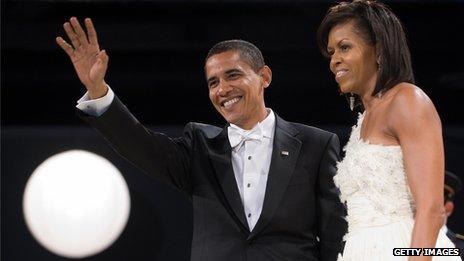
That was then: four years ago on the night of Obama's inauguration
His book, subtitled "reclaiming the American dream", was called The Audacity of Hope. And "audacity" means - according to my dictionary - intrepid, daring, adventurous, recklessly bold, marked by originality and verve.
Were the president of that debate to a write a book, it might be entitled The Aloofness of Lowered Expectations.
But there has been another vital moment in this election campaign - the moment Obama came off the trails to deal with the ravages of the great storm.
It could be seen as the moment he won the election. A president in a raincoat, rather alone, coming down the steps of Air Force One, walking tall through the lashing rain.
By stopping campaigning, he killed Romney's momentum and looked like a chief in command. Perhaps he has found his groove. Perhaps I've just got used to his style.
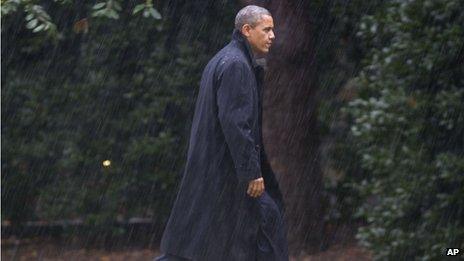
For somebody who can be an amazing orator, Obama can also be a really dull one.
For the last few days of campaigning, he really pulled out all the stops and his victory rally was a classic.
When he takes on the cadences of a black preacher you know he is fired up and ready to go. But at other times he can be as unpersuasive and uninspired as a long-winded professor in love with the sound of his own voice.
I'm tempted to say he can be lazy, but I doubt that it is that simple. Perhaps he just gets tired of the rather forced passion play that is the lot of a democratic leader, and believes too much in the force of rational argument.
Here's the problem. Whether it's Sandy, or the Gulf, or the economy, in a complex modern world acting as a co-ordinator, allowing experts to do their job, may be the most grown-up and effective way of dealing with problems.
I often feel that Obama is in office out of a burdensome sense of duty, not a selfish zest for the job. He is self-confident, which is not unusual in a senior politician.
But he's also self-contained and balanced. He's the polar opposite of Bill Clinton.
He lacks the driving need to be loved, the craving to excel, the desperation for the warmth of human contact that compels Clinton to be a far better practitioner of the art of politics.
Many Americans like to see the guy in the saddle, riding herd on a crisis, corralling it into some sort of shape and sense.
People learn. Sometimes they learn just in time.